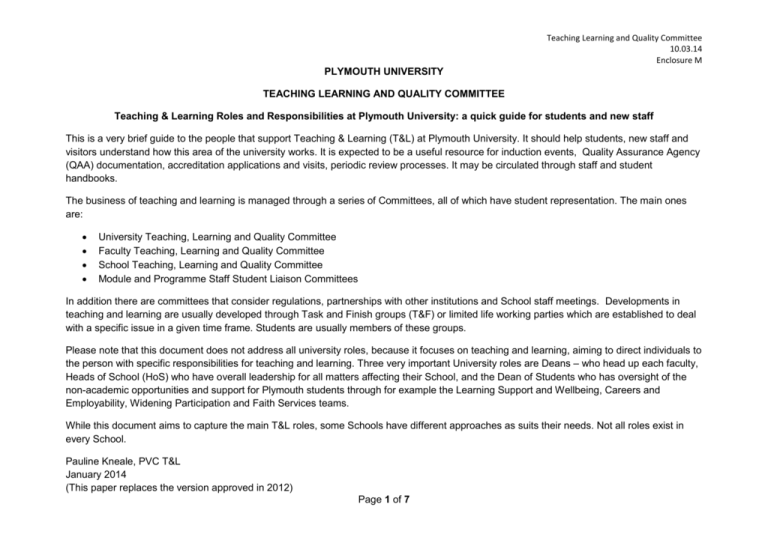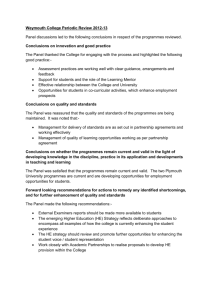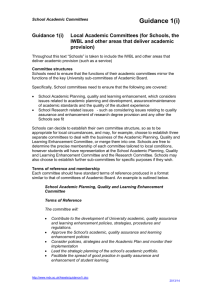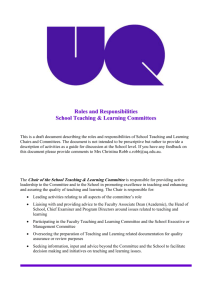document - Plymouth
advertisement

Teaching Learning and Quality Committee 10.03.14 Enclosure M PLYMOUTH UNIVERSITY TEACHING LEARNING AND QUALITY COMMITTEE Teaching & Learning Roles and Responsibilities at Plymouth University: a quick guide for students and new staff This is a very brief guide to the people that support Teaching & Learning (T&L) at Plymouth University. It should help students, new staff and visitors understand how this area of the university works. It is expected to be a useful resource for induction events, Quality Assurance Agency (QAA) documentation, accreditation applications and visits, periodic review processes. It may be circulated through staff and student handbooks. The business of teaching and learning is managed through a series of Committees, all of which have student representation. The main ones are: University Teaching, Learning and Quality Committee Faculty Teaching, Learning and Quality Committee School Teaching, Learning and Quality Committee Module and Programme Staff Student Liaison Committees In addition there are committees that consider regulations, partnerships with other institutions and School staff meetings. Developments in teaching and learning are usually developed through Task and Finish groups (T&F) or limited life working parties which are established to deal with a specific issue in a given time frame. Students are usually members of these groups. Please note that this document does not address all university roles, because it focuses on teaching and learning, aiming to direct individuals to the person with specific responsibilities for teaching and learning. Three very important University roles are Deans – who head up each faculty, Heads of School (HoS) who have overall leadership for all matters affecting their School, and the Dean of Students who has oversight of the non-academic opportunities and support for Plymouth students through for example the Learning Support and Wellbeing, Careers and Employability, Widening Participation and Faith Services teams. While this document aims to capture the main T&L roles, some Schools have different approaches as suits their needs. Not all roles exist in every School. Pauline Kneale, PVC T&L January 2014 (This paper replaces the version approved in 2012) Page 1 of 7 Teaching Learning and Quality Committee 10.03.14 Enclosure M Title Core Responsibilities Exemplar Activities and Working Processes (these are indicative rather than definitive) 1 Pro ViceChancellor Teaching and Learning Is responsible for all aspects of the quality assurance, enhancement and strategic development of the processes which support and assure the student experience of teaching and learning at Plymouth University. Works with ADTLs, DHoST&L and all university colleagues involved with teaching and learning processes, quality and standards matters, and with student representatives. Has oversight of engagement with internal and external reviews that bear on taught and research programmes. Drives the enhancement of learning, teaching and student experience for all members of the university. Chairs University Teaching and Learning Committee Works with colleagues regionally and nationally to ensure that strategy and developments align with policy developments and best practice for delivery. Ensures that the university is best represented on national and international forums to enhance external awareness of practice at Plymouth, and enhances processes and practices across the university. 2 Associate Dean Teaching and Learning The ADTL has Faculty responsibility for the strategic leadership and direction of teaching and learning development, resourcing and enhancement, for the implementation of university policy in the Schools, and for ensuring that quality assurance is carried out to a high professional level in all Schools. The ADTL supports School, Faculty and university colleagues to implement enhancement and assurance procedures; Chairs Faculty T&L and other Faculty committees which will receive and work on policy matters, the arrangements for quality assurance and student experience for all taught programmes; represents the Faculty on university committees, and maintains communications about committee matters with the Faculty; ensures students are represented on all School and Faculty committees and assures students are trained and inducted into their roles. The DHoST&L working with the school senior leadership team, reporting to the Head of School, is responsible for all aspects of teaching and learning within the School, working with programme managers and School and Faculty administrators. Activities include oversight of programme and module action plans, coordinating the School action plans, ensuring documentation and online publicity is student friendly and accurate. (PVCT&L) (ADTL) Chairs Faculty Teaching and Learning Committee 3 Deputy / Associate Heads of School Teaching and Learning (DHoST&L) Chairs School Provides strategic leadership in enhancing learning and the broader student experience to raise academic standards and student attainment within the School through ensuring: research and scholarship informs all aspects of teaching and learning; university policies and procedures are implemented in a timely manner; modules and programmes are Page 2 of 7 Teaching Learning and Quality Committee 10.03.14 Enclosure M Teaching and Learning Committee 4 Programme Leader Chairs Programme Committee and Staff Student Liaison Committee appropriately resourced with trained leaders; programme committees work effectively; policy and School wide matters (e.g. admissions, marking criteria, external examiners comments, induction, tutoring, internationalisation, ….) are discussed at School Teaching and Learning committees and outcomes disseminated effectively to programme leaders. Is responsible for the vision and delivery of a high-quality student learning experience through coordination, academic leadership, operational and day to day management of the programme(s) of study. Liaises with internal and external bodies, eg. staff/student committees, employers, programme teams and partner institutions, ALPs, admissions and student support services, including Learning Support and Wellbeing, Sustainability, Careers and Employability, and the Library. Supports the Head of School at assessment and award boards. Checks that external examiners are nominated in a timely way and are fully briefed, and that they receive a formal written response to their reports. Works with ADTLs, Heads of School and Associate Heads of School Teaching and Learning, module leaders and Faculty support professionals to ensure quality standards, for example, delivery of the Annual Programme Action Planning process, taking account of pass rates, external examiners’ comments, module reviews, SPQ, NSS, PTES, PRES, KIS. Delivers and ensures a high quality student programme and experience through monitoring programme handbooks, websites, course documentation, online resources, pastoral support, placements, work-based internships, induction and open days. Ensures review meetings are of the highest possible standard. Contributes to the development of individuals and teams (for example through input to PDR processes, Peer Review processes, Programme Team Meetings). Resolves problems affecting the quality of course delivery and student experience within own areas of responsibility referring more serious matters to ADTLs/AHTLs /DHTLs as appropriate. 5 Module Leader Responsible for all aspects of leading and delivering the design, teaching, assessment, quality, updating and enhancement of the module and the student experience of that module. Activities include co-ordinating and leading all aspects of teaching, the assessment schedules, module handbooks, alignment with university and benchmark learning outcomes, examination processes, module review and action planning, liaising with the programme managers to respond to external examiners as appropriate, taking account of NSS and SPQ comments. Page 3 of 7 Teaching Learning and Quality Committee 10.03.14 Enclosure M 6 Senior Personal Tutor Contributes to programme and School level discussions to ensure groups, including the student representatives. alignment between modules and programmes, and with external and internal bodies. Facilitating positive discussions with students, with respect to student feedback. Advises and supports personal tutors in carrying out their role, responding to their queries and concerns, cascades and signposts further sources of support and advice as appropriate. Ensures all Personal Tutors are aware of the development opportunities available to students at Plymouth, eg Plymouth Award, co-curricular modules, volunteering, as well as the importance which we and employers attach to the broader HE experience. Briefs and supports first-time Personal Tutors Reports on the Personal Tutorial System to Student-Staff Liaison Committee, through systematically gathering feedback from student course representatives and staff on the efficacy of the personal tutoring system and highlighting issues for programme committees to consider. Fosters awareness of and liaison with central support service providers such as Counselling, Learning Development Disability Assist, etc and particularly ensuring that all tutors know which member of support services staff has dedicated responsibility for their School. Supports students who are suspending, withdrawing or transferring. Facilitates processes involving personal tutors, such as when students are reallocated to another personal tutor. 7 Timetabling Coordinator Responsible for the delivery of the Timetable on behalf of a School or suite of programmes. Liaison with School colleagues and central Timetable team. Page 4 of 7 Teaching Learning and Quality Committee 10.03.14 Enclosure M 8 Student Representatives for Faculty and University business Represents views of students in Schools at Faculty and university meetings. Contributes to strategic discussions, policy development and enhancement of the Plymouth University experience. Liaison with Student reps for modules and programmes, in UPSU and in cross faculty forums to seeks student views and opinions on the experience and quality of their learning. Feeds back ideas, responses and issues raised in Committees and informally to students Supports student(s) in raising issues, ideas or complaints. 9 Student Representatives for Programmes and Schools Student representatives are elected to represent the views of students for modules, programmes and the student experience. Actively seeks students’ views and opinions on the experience of the quality of their learning and liaise with module and programme leaders formally through staff student liaison committees and informally. Feeds back ideas, responses and issues raised to students Support students in raising individual issues, ideas and complaints. 10 Faculty Business Manager Responsibility for management of Faculty Supports the Faculty strategic planning process via Faculty Executive / professional services (functions and Management Group. staffing), including teaching quality Facilitates communications between academic and professional services processes within the Faculty (and where necessary external to the Faculty) so as to ensure that university processes are carried out efficiently and effectively. 11 Faculty Registrar Responsible for all aspects of management and leadership of the academic administrative functions with the Faculty, and for contributing to policy formulation at both Faculty and institutional level. Develops and implements, with the ADTL, the Faculty quality assurance and programme review and approval Has responsibility for a range of processes including registration; student records maintenance; administrative processes related to assessment, progression and award. Co-ordination of disciplinary, complaints, appeals, and extenuating circumstances; graduation and external examiners. Liaises closely with ADTLs, FBMs, the Appeals Office and Quality Office. Representation on all University Process Groups, Academic Regulations SubCommittee and University level policy, project and implementation groups. Page 5 of 7 Teaching Learning and Quality Committee 10.03.14 Enclosure M process. Contributes to the Faculty strategic planning and decision-making processes with a particular focus on programme and quality developments. (Some operational responsibility may be delegated to a Deputy FR where appropriate). 12 Senior Administrator (Programmes) at Faculty level Provides operational support at Faculty level for module and programme records, student records, assessment, disability assist information; co-ordination, oversight for groups of programmes. Works with FRs, ADTLs, DHOS T&L and programme managers to support programme delivery and student support at a Faculty level. Responsible for operational aspects of extenuating circumstances, assessment offences and student induction. 13 Senior Administrator (Quality) Operational responsibility for administration of quality processes within the Faculty. Works with ADTLs, Programme Managers, FBMs and Faculty Registrar as appropriate to provide advice and guidance on University quality procedures, co-ordination of review and approval events, curriculum maintenance, operational support for new programme development, and for external requirements (eg, QAA, professional body accreditation, external examiners). 14 Programme Administrator in a Faculty/School Operational responsibility for studentrelated administrative processes for the programme(s), including registration, student records maintenance and provides the first point of contact for students in the School. Works well with students and programme managers and module leaders on all aspects of programme delivery. 15 Subject Forum Chair Provides the first point of contact between university and colleges for their disciplines, ensuring that university standards for quality assurance and enhancement are aligned. Works to ensure parity of standards across programmes in a subject cluster, across a number of partner institutions. Co-ordinates annual programme monitoring and facilitates the sharing of good practice between programmes and institutions. 16 Academic Liaison Person Provides a key link between Colleges and cognate university faculties in the development, updating and operation of university awards delivered by partner institutions. Attends programme committees at Partner Colleges, responds to questions from partners about PU processes, and communicates developments and enhancements in university processes and procedures. (ALP) (In some Faculties this role is combined with the Senior Administrator (Programmes) role). ALPs provide the support at programme level, working with programme leads; Page 6 of 7 Teaching Learning and Quality Committee 10.03.14 Enclosure M for example in the area of progression to awards delivered at the university. 17 Head of Quality Operations Quality Assurance Advisers The Quality Office contributes to strategic development of institutional policy relating to quality and standards (including translation of QAA requirements into institutional practice); development of institutional procedures related to review and approval and external examining; communication and provision of advice to wider university community and partners on these matters. Provides co-ordination of arrangements for periodic review, institutional review of partners and approval of provision with external partners at university level, and the arrangements for QAA Institutional Review. Coordinates responses to QAA consultation (and those of other external bodies, as appropriate). Has operational responsibility for the arrangements for approval of partnership programmes. Co-ordinates arrangements for NSS, SPQ and PTES and reporting of outcomes. Manages the formal appointment of external examiners and provides institutional oversight of their reports. Page 7 of 7






